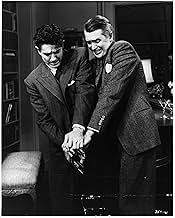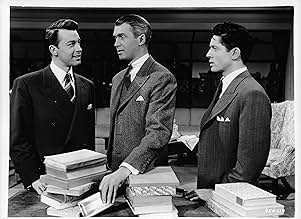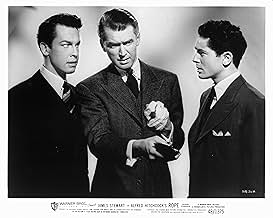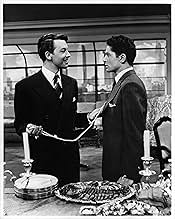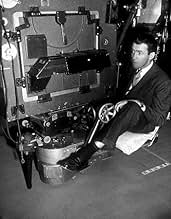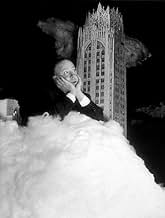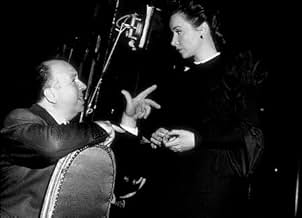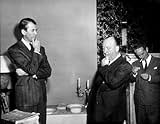A excitação de cometer o crime perfeito leva dois homens a matar e, em seguida, a organizar uma festa no local do crime convidando o pai e a noiva da vítima e ainda um professor de filosofia... Ler tudoA excitação de cometer o crime perfeito leva dois homens a matar e, em seguida, a organizar uma festa no local do crime convidando o pai e a noiva da vítima e ainda um professor de filosofia que os inspirou inadvertidamente.A excitação de cometer o crime perfeito leva dois homens a matar e, em seguida, a organizar uma festa no local do crime convidando o pai e a noiva da vítima e ainda um professor de filosofia que os inspirou inadvertidamente.
- Direção
- Roteiristas
- Artistas
- Prêmios
- 4 vitórias e 3 indicações no total
- Mr. Kentley
- (as Sir Cedric Hardwicke)
- Man Walking in Street After Opening Credits
- (não creditado)
- Woman Walking on Sidewalk
- (não creditado)
Avaliações em destaque
Leave it to Hitch to venture into uncharted Hollywood territory. First, the movie's a "real time" screenplay that blends 80-mintes of character time into 80-minutes of screen time without a noticeable cut-away. It's the first time, I believe, this was tried. Practically speaking, the movie's almost a filmed stage play. The pitfalls here are many and obvious. Fortunately, the script is generally involving and avoids a chief pitfall by developing the storyline without much drag. At the same time, the characters are a generally colorful lot, especially caterer Wilson (Evanson) and dowager Collier (Atwater). Then too, Hitch's camera heightens developments in unobtrusive fashion, so that we get listener reactions at the same time the speaker is speaking. That way our interest is spread over a number of characters. Second is his use of gay actors (Dall & Granger) to portray scarcely veiled gay characters Brandon & Phillip, respectively. I guess the movie was banned in many locales because of that taboo, (IMDB). Nonetheless, the aspect makes for an interesting subtext, one that Hitch was later to use in Strangers On A Train (1951).
Acting-wise, Dall does well as the intellectual snob, while Granger plays a nervous second fiddle. The Nietzschean theme seems a little shopworn so soon after WWII, but works well enough here as dark motivation. However, I could have done without Rupert's (Stewart) reproofing lecture at movie's end. There should have been a subtler alternative. Plus, his character comes across as something of a stretch. But then convention required someone to put things right, even if Rupert has rather confusingly inspired the Nietzschean-type murder, in the first place
All in all, I can see why many balk at Hitch's experimental result. It is a noticeable departure from the norm. Still, I think the aspects come together well enough to remain an engaging hour-plus, even if not among his best suspense features. At the same time, I can see why the real-time single-set approach never caught on. In lesser hands, it's a time bomb.
"Rope" is about two college students - the slimy Brendon Shaw (John Dall) and his friend and sub-texted-gay-partner Phillip Morgan (Farley Granger) who murder an old college mate and then, minutes after, host a dinner party to prove their calm, intellectual superiority and their "right" to kill off the lower echelons of society - they believe they are exempt from common morality. Central to this is their smug desire to show off their theory to their old mentor, Rupert Cadell (James Stewart), who is attending the party, and to get him to agree with their theories.
As the movie is essentially confined to one room, and one take, there's a definite "play" feel to the movie. While this worked wonderful with "12 Angry Men", the script and character interaction isn't quite smart enough here to sustain it. There's a lot of pontificating by Shaw, and some fine retorts by Cadell but there's a sense of forcedness about it at the same time. Only 3 of the characters are drawn with enough conviction, and it is only Cadell who we can really admire (Granger's Morgan seems to be too much of a nervous twitching type to add much to the movie). The script does allow us to gape with incredulity at the Nietzsche-esque theories of the "superman" espoused by Shaw, and the gay subtext is amusingly, and cleverly, done but there's an inevitability about the whole story - we know what will happen, it does, and this creates an ultimate lack of tension (when compared to, for example, Hitchock's "Vertigo").
The direction is, as would be expected, smart and - naturally - innovative here. The camera drifts about from character to character, as Hitchock tries his "one cut" approach, and there's some nice background detail (such as Hitchcock's flashing neon signs) to show the passage of time/current theme. Overall "Rope" is well worth seeing - it's not quite a failed experiment, nor a successful one. It's a "curio" which is worth appreciating for realizing why it was never really emulated since.
A quick bit of research reveals that this movie was in fact shot in 10 takes, ranging from 4 minutes to just over 10 minutes. The transitions between those takes are quite easily spotted, as Hitchcock alternates between having the camera zoom into a dark object, totally blacking out the lens, and making more conventional cuts. This little "deception" (if you could even call it that) to make it seem as if the film consists of one continuous take didn't bother me at all. After all, what is a film but a series of illusions being played on the viewer?
'Rope' is undeniably still the result of a filmmaker who is eager to experiment with the medium and who has confidence in his stylistic prowess. However, when watching films that are considered radically innovative and highly influential, I sometimes find myself appreciating their inventive nature more than really loving them. But with 'Rope', Hitchcock delivers a film that is stylistically inventive while being utterly compelling as well. It's a case of style enhancing substance, as I enjoyed this film for more than just its technical bravura.
About that technical bravura though. The long takes may give this film the feel of a recorded stage play but calling it that would be selling it short. The camerawork is awe-inspiring here, not only in how it navigates the different players and spaces within the single location setting, but also in its framing of certain objects or people in order to manipulate the viewer and generate tension from seemingly ordinary situations.
In addition to the virtuoso long takes, there is also great use of color and lighting in this film. 'Rope' was Hitchcock's first color film, and he seamlessly integrates this added opportunity for visual flair into his trademark style, especially during the suspenseful climactic sequence, where you have those red and green neon lights flickering outside the apartment window. The reflection of these neon lights tinges the proceedings with a hint of surrealism (something Hitchcock would later return in Vertigo). Furthermore, the movie lasts 80 minutes and appears to take place in "real time", but the time frame it is covering is longer. For example, the actual dinner lasts only 20 minutes in the film and the sunset happens way too quickly. Though I am not technically proficient enough to discern exactly how this effect was achieved, I'm pretty sure it involved some inventive way of lighting the scene. The film ultimately concludes with a breathtaking final frame, a remarkable combination of perfect composition and vibrant colors. The exaggeratedly stilted look of that frame adds to the feeling that you're watching the re-enactment of a painting.
To my surprise, I found out that Hitchcock himself later dismissed his experimentation with 10-minute takes in this film as a stunt. Like I mentioned earlier though, I found much more to latch onto in this gripping film than just an appreciation of the innovative filmmaking. All the actors shine in their respective roles, and I thought the 3 central characters had great chemistry. Thematically, it fascinated me how obviously fascist philosophies, like the idea of murder as a privilege of the superior few to do away with inferior beings, are openly discussed only 3 years after World War II had ended. Hitler is even mentioned by name. The blunt way in which the sociopathic Brandon repeatedly talks about the "intellectually superior individuals" and "inferior beings whose lives are unimportant" first struck me as darkly humorous, a satire of how preppy, private-schooled, upper-class brats think of the rest of the world. There is some slick screwball dialogue at other moments that seems to hint at that comedic approach. But the repeated discussions about superiority, followed by that final moralizing monologue by Rupert made me realize that Hitchcock is in fact issuing an explicit warning about the dangers of such philosophies. It is probably exactly because this film came out right after WW II that a genuine fear of fascist ideologies still looms large over 'Rope'.
Unfortunately, that ending is the one thing about this film that didn't work for me. First, it is clearly established that Rupert is the one who has planted his theory about murder being justifiable for a few "superiors" in the boys' head and that Brandon and Phillip put his idea into practice mostly to impress their former headmaster. When we hear them discuss the topic at the party, it first seems as if Rupert is being facetious, but he goes on to explicitly state that he is not kidding. But later still, when he finds out his former pupils have put his theory to the test, Rupert makes a 180-turn, saying that they "twisted his words". He goes on to give a big heavy-handed, moralizing speech that spells out the exact noble principles that we are supposed to take away from the film. I didn't like that sudden shift into didactic moralization and the fact that it comes as the result of such a strange and inconsistent character turn kind of muddied the social commentary for me. I think I would have liked the film better had it indeed been that sharper dark satire I first thought it was intended to be, with Rupert as the half tongue-in-cheek, half serious instiller of fascist ideologies in rich and spoiled upper-class brats. But given the broader context at the time of the film's release, its more explicit approach to that dicey topic is certainly understandable.
Overall, watching 'Rope' was a very enjoyable experience. As a fan of films that use long takes (be it one continuous take or multiple longer ones), it was cool to see the film that undoubtedly influenced many of them. Despite Hitchcock's own dismissal of his visual experiment as a 'stunt', 'Rope' emerges as a daring exploration of style and substance. In addition to the technical mastery, the film boasts excellent performances from its main cast and includes some surprisingly open discussion of fascist ideologies, offering us a glimpse into post-World War II anxieties. The unsatisfying ending, with its inconsistent character turn and heavy-handed moralization, keep the film from being a legit masterpiece in my book, but 'Rope' remains a compelling and largely successful cinematic experiment from a master storyteller unafraid to challenge stylistic and thematic conventions.
The whole idea was to build the suspense and make the action appear to take place in "real time" by not having the camera appear to blink. Thus the 10-minute takes (and three fade cuts at approximately 20-minute intervals); and I think it works very well. It also makes one appreciate the excellence of the acting. It is extremely difficult for actors to execute a film flawlessly in only eight 10-minute takes, and the three principal actors did a fantastic job under very stressful circumstances.
I think the reason the film was not a big box-office success is that people were expecting the usual Hitchcock action (think of earlier Hitchcock films such as Saboteur, Foreign Correspondent, The 39 Steps or The Man Who Knew Too Much). But any serious film buff should not miss this film.
On the subject of filmmaking - Hitchcock filmed this in as much of a single take as possible. I believe there are only five edits in the whole thing. I can wholeheartedly tell you that it was no gimmick on Hitchcock's part. The play's plot requires that a certain amount of tension be maintained. Tracking shots are used for this purpose and quite well in my opinion. Timing, position and prop movements alone are to force us to stand in awe of a logistical challenge. All the actors are played superbly. The dialogue is natural and flowing. The finest bit of timing involves a swinging kitchen door, the rope, and the fear of discovery.
In short, this is a fine film that cannot disappoint. Highly recommended and will be well worth your time.
Você sabia?
- CuriosidadesSince the filming times were so long, everybody on the set tried their best to avoid any mistakes. At one point in the movie, during the first take scene, the camera dolly accidentally ran over and broke a cameraman's foot, but to keep filming, he was gagged and dragged off the soundstage. Another time, a woman puts her glass down but misses the table. A stagehand had to rush up and catch it before the glass hit the ground. Both parts are used in the final cut.
- Erros de gravaçãoWhen Phillip and Brandon put David in the chest, the rope is clearly around David's neck and completely inside the box. But in a few minutes Phillip finds the rope hanging, very far, outside the box.
- Citações
Mrs. Atwater: Do you know, when I was a girl I used to read quite a bit.
Brandon: We all do strange things in our childhood.
- Cenas durante ou pós-créditosThe closing credits list the victim David Kentley first, and the rest of the cast as credited with a phrase describing their relation to him ("His friends - Brandon, Phillip", "David's girl - Janet", etc) and use only a first/last name.
Rupert Cadell is listed last, and with his full name and without any phrase of relation.
- ConexõesFeatured in Great Performances: James Stewart: A Wonderful Life (1987)
Principais escolhas
Detalhes
Bilheteria
- Orçamento
- US$ 1.500.000 (estimativa)
- Faturamento bruto mundial
- US$ 11.580
- Tempo de duração
- 1 h 20 min(80 min)
- Cor
- Proporção
- 1.37 : 1



